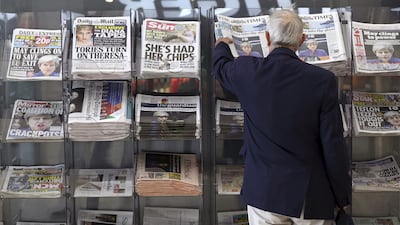After calling a snap general election that cost Britain’s Conservatives their majority, prime minister Theresa May was forced to pursue a deal with the Democratic Unionist Party of Northern Ireland to form a minority Conservative government with DUP support.
Arabic-language commentator Salam Al Saadi wrote that Mrs May was confident of her victory due to a couple of interrelated factors.
“First, Brexit was associated with a boosted economy, increased employment and a rise in real wage.
“The second factor is related to the wave of terrorist attacks that have widened the Conservatives’ popularity throughout Europe,” he wrote in the London-based pan-Arab newspaper Al Arab.
Al Saadi underlined the deeper impact of these attacks in the United Kingdom given their successive occurrence in the month leading up to the election.
However, he argued that the Conservatives’ winning plank was the restoration of sovereignty that prompted Mrs May to call an early election.
“As much as Brexit revolves around tangible economic outcomes, it is also associated with a growing national sentiment among the British people.
“The pro-Brexit movement highlights Europe’s inability to face major challenges such as immigration, terrorism and competition on the one hand, and to the limitations it imposes on the UK on the other,” he said.
According to the writer, the need to restore sovereignty has become increasingly important after the tough negotiations were launched with the EU last year.
He said that Mrs May had started promoting the idea that the EU wanted to “subjugate” the UK and that the Europeans wanted the British to pay the price of their exit through the terms that would be imposed upon them.
“But a year has passed after the referendum and the details of Britain’s EU exit and its economic repercussions remain unknown to the British people, hence their growing suspicions and concerns.
“It is not yet known whether the victory of the rebellious rural nationalist sentiment in the Brexit referendum will withstand the blow dealt to the Conservatives in the latest election,” he said.
Writing in the London-based pan-Arab newspaper Asharq Al Awsat, Lebanese columnist Rajeh El Khoury highlighted the need for the new British government to develop a proactive strategy vis-à-vis the incubators of terrorism in the UK.
According to reliable sources, the British foreign intelligence service, MI6, had received a report from a prominent and highly credible Arab country following the Manchester attack. The report stated that terrorists from within the UK were preparing an attack before the date of the election.
“The head of MI6, Alex Younger, informed the British authorities of the report and immediately sent a copy thereof to Andrew Parker, head of the British security service, MI5 [the domestic counter-intelligence and security agency of the UK].
“It is not clear, though, what measures were taken by the British authorities upon receiving the report that had reached MI6 seven hours before the London Bridge attack,” El Khoury said.
Even though the British government had stepped up its security measures following the Manchester attack, the terrorists were able to perpetrate their crime that prompted Mrs May to draw the line.
“Things cannot continue as they are. We have been too tolerant of extremist activities in our country,” Mrs May said after the London attacks. “We need to become far more robust in stamping it out across the public sector and across society.”
But, the writer said, Mrs May’s concern comes a bit late in light of the growing extremism in the UK that has filled the gap between the keenness to safeguard freedom and the tolerance to extremism that has seen terrorists moving freely.
“Such a policy of tolerance that was implemented under the pretext of the protection of freedom and for other reasons as well – namely sheltering terrorists to use them as leverage against the regimes from which they have fled – amplified the issue to an unbearable level,” he added.
Consequently, El Khoury saw the need to develop a strategy that prevents values of freedom from providing a shield and a way out for extremists.
* Translated by Jennifer Attieh
translation@thenational.ae

